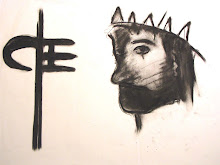To Dominic Marbaniang
The huge import of theology and its tremendous consequences among seven billion
people -- or six, if it is true that atheism / agnosticism is the third largest
'religion' in our time -- demand thoughtfulness and philosophic criticism and
understanding.
But why are you studying modes of claim-making, i.e.
methodologies, styles, traditions of thological argument? -- is this a taxonomy of the odd
varieties of god-speech? -- a proposed alphabet, or ground-logic of
god-speech?
This
sounds like an ambitious project. But there may be a few good questions
to ask before we devote more time to cataloging the varieties of religious
argument. Philosophy lets its curiosity loose in this intriguing field --
but to what end? Perhaps the point is to help people identify and assess
religious arguments, since all of us are exposed to them, and many are oppressed by them. We all need some help. If that is your
project, then it seems worth doing -- it offers an important service.
The idea
of a taxonomy of atheisms, alongside another project in which theology was the
subject being divided up into meaningful categories, might offer results.
If there is a rationalist atheism (perhaps the Carvakas or Daniel
Dennett), and also a rationalist form of theology (Parmenides and Zeno, who you cite above -- perhaps we should include Spinoza), then some questions
follow:
--- is
the 'rationalism' more a common factor than the difference over theism? Perhaps rationalists
of all stripes share a common orientation to the world. God-speech is not
therefore a defining orientation for these thinkers. Regardless of the prime
denial, or prime assertion, these thinkers think about the world in
fundamentally similar ways
--- if
this is the case, what light does this throw on the subject of theology?
Is the prime assertion merely one sort of assertion among many
other examples? Or perhaps it makes no assertions at all -- its
significance is not propositional -- here perhaps we would begin talking about kenosis and sunyata and like ideas about unknowing and emptiness.
---
rationalism is just one case; presumably the principle of the 'parallelism
between theism and atheism' is general; thus there are empiricist theologies and
empiricist atheisms -- Aquinas argues from observing the world, and so does
Richard Dawkins. Dawkins and Aquinas may therefore be kindred thinkers.
Their antagonism is an artifact of current politics, current trends in
popular culture -- in the thirteenth century and presently. Likewise there are perceptualists among believers (Berkeley) and atheists (Russell).
This kind
of analysis argues for the primacy of philosophical orientation, deeper even
than theology.
What is our relationship
to the transpersonal -- is it personal, impersonal, or non-personal? Whatever these relationships or our
imaginings about them may be, whatever connection human beings make to the
transpersonal, to 'Ultimate Reality,' to God -- to the ineffable -- in whatever
case, perhaps we can say: rationalists of one kind denounce this idea and rationalists
of another kind assert it.
How can we reconcile transcendence and immanence? There is the maya theory, that the world is an
illusion, and the counterpart idea, the dukkha theory, according to which,
whether suffering is real or merely imagined, it is our
duty to treat it as if it were real and offer service to
suffering. Suffering supersedes our scruples about reality. Perhaps that is a theology.
Theisms and atheisms stand on the same ground,
as it were ... they are antagonists about the same proposition
... but more primarily, the prime assertion precedes the prime
denial. Therefore disbelief is a function of belief. Belief precedes doubt and makes doubt possible (Wittgenstein
makes this point). Strictly speaking, atheisms are forms of theisms. Both
forms work in the same frame of reference, but assertion precedes denial.
Philosophy is more comfortable with openness and theology is
more attracted to exclusivity. (Whatever my 'philosophy' is, it makes sense that there are others. But perhaps it doesn't seem like 'worshipping' if the object of my worship is mine alone).
The
believing mind does not -- save in exceptional cases -- freely give up its
history, symbols and sacred places. It rarely has the confidence that it
will find a new way to express the prime assertion.
In a sense, even a consistent materialist has a
theology -- but 'theology' in this case is roughly equivalent to cosmology: a
general theory of the universe.
Socrates would argue that theism and
atheism and cosmology and like studies are all pretty far from the immediate
problems of human ignorance facing moral demands. Philosophy in Socrates'
version is simply the obligation to think. But as we have noted in our discussions, if this stripped-down Socratic quest (to become and remain thoughtful)
evolves into a definite philosophy, such as rationalism or skepticism or
empiricism, then this new creation is on a par with atheisms, theisms, and
other isms … categorized as a definite kind of ism or view. Then the
taxonomic work you are proposing can begin.
Philosophy
descending into 'philosophies' and 'isms' is unproblematic as long as the new
creation (whatever it may be) then becomes a new object of scrutiny and has to
answer the Socratic elenchus and cross-examination. This activity seems
to me the core concern of philosophy, though we often let our curiosity wander
off into distant corners of the intellectual universe. We just have to
learn how to get back to the core concern of thinking.




No comments:
Post a Comment